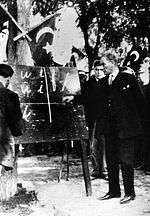Turkish/Introduction
< TurkishAbout the Turkish language
See also: Turkish language
History
The earliest forms of the Turkish language were written in Orkhon script.
During the Ottoman Empire, Ottoman Turkish was influenced mainly by Arabic and Persian. The primary writing system was based on Arabic and Persian script. Due to the difficulty of learning the script only about 10% of the Ottoman Turkish population were literate.


However, in 1928, modern Turkey's hero, Mustafa Kemal Atatürk, had changed many things about the Turkish language. He changed the writing system to a Turkish variant of the Latin alphabet (without the letters Q, W or X, and added the letters Ö and Ü from German, Ç from Albanian, Ş from Romanian; and also added the letters Ğ, I, and İ to represent certain sounds which weren't present in any other Latin-based languages at the time), and replaced many loanwords with older or constructed Turkish words. The change of the writing system heavily benefited Turkey's youth, and during the 1930s, the literacy rate shot up to 70%. Today, the overall literacy rate is approximately 87%, but the reason for the seemingly low literacy rate (for our time) has to do with personal family matters rather than any difficulty, even though it's compulsory for all Turks to go to school up to the age of 16, so technically their parents are both breaking the law and depriving their children of a wonderful gift: knowing how to read and write.
Geographic distribution of Turkish

In terms of number of speakers, Turkish is the largest Turkic language in the world, spoken by over million people worldwide.
Turkish is the official language of Turkey and the Turkish Republic of Northern Cyprus, and is a recognized minority language in Kosovo and Macedonia. It is also an official language in the Republic of Cyprus.
There are also two million Turcophones in Germany, due to its very large Turkish minority living there; a slightly smaller minority living in Bulgaria; and also over 100,000 living in France, Netherlands, Belgium, United Kingdom, Austria, United States and Uzbekistan. There are also smaller Turkish-speaking minorities living elsewhere, most notably Greece, Russia, Canada and Azerbaijan*.
Dialects
Within Turkey
Standard Turkish is basically the Turkish spoken in Istanbul, which has no particular accent, and is spoken clearly, smoothly and slang words are non-existent.

However, Turkey is a place full of surprises and diversity, and many dialects of Turkish exist. Here are the most common:
- Rumelice, which is spoken by muhajirs in the Rumelian area.
- Edirne, spoken by the inhabitants of Edirne*.
- Doğu, spoken in eastern Turkey, influenced by Azerbaijani.
- Güneydoğu, spoken in southeastern Turkey, heavily influenced by Kurdish.
- Karadeniz, the former spoken in northern Turkey in areas surrounding the Black Sea.*
Outside Turkey
- Karamanlıca - spoken in Greece by Karamanlides, a Greek Orthodox, Turkish-speaking people whose ancestry goes back to central Anatolia.
- Kıbrıs - a dialect of Turkish spoken by Turkish Cypriots.
So yes, there's a variety of different dialects spoken by Turks, but don't let that put you off, because most Turks, regardless of whether they speak standard Turkish or a certain dialect, will understand standard Turkish, as it's the standard for all schools in Turkey and Northern Cyprus.
Learning the language
Many people whose native language is not Turkish complain that Turkish is very hard to learn. Turkish, being an Altaic language, has grammar and vocabulary that is very different from Indo-European languages. Learning Dutch for a Brit or learning Italian for a Romanian is much easier than them learning Turkish. On the other hand, there are similar languages to Turkish such as Mongolian or Kazakh.
Advantages of Turkish (for English)
- There is no pronunciation help next to the word. Because every letter is pronounced the same in every word.
- Turkish is a phonetic language.
- Learning the alphabet is enough to pronounce the word correctly.
- Once you hear a word, you'll know where to look in the dictionary.
- There are no dots dividing the word into its syllables or marks indicating a stressed syllable.
- Spelling determines the syllable count and stress.
- Turkish nouns have no gender and its verbs, except for "to be" are all regular.
- Look at a noun and you'll know all its declensions.
- Look at a verb and you'll know its tense, voice, etc.
- Turkish has no articles.
- You can hardly ever find exceptions in Turkish. Nearly all words obey strict rules.
Disadvantages of Turkish (for English)
- Unlike in English, all Turkish nouns are inflected for case
- Turkish verbs focus on aspect, modality, and evidentiality more than English.
The benefits of learning Turkish
Approximately 250 million people worldwide speak a Turkic language, Turkish being the most common. However, all Turkic languages have a very high degree of mutual intelligibility, therefore learning Turkish means you can speak to 100 million more people properly, and 150 million more roughly, but still understanding the basic gist of the conversation.
So, 250 million, that's a lot of people, huh? Doesn't that sound like good business and marketing opportunities to you? Trust me, Turkic countries aren't as impoverished as you think. The West's definition of poor is actually very exaggerated. Many, much poorer countries are still good places to do business. Take Africa, for example. At the moment African countries have the fastest growing mobile market in the world. When entrepreneurs hear news like this, they immediately appreciate Africa's potential to generate lots of revenue in the mobile phone industry. As for Turkey, it's richer and in better shape than most African countries, so financially you could do really well there. As a matter of fact, Turkey is a member of the G20, and is the 17th most industrialised country in the world. Turkey's GDP ranks 17th, and has one of the fastest GDP growth rates in the world. Turkey has a developed services sector; a large, rapidly growing tourism sector; as well as construction, electronics, textiles and automotive industries which are very important to Turkey's economy. So who says Turkey's economy is bad?
Turkey and Northern Cyprus are also political hotspots, with many things going on in the Turkish parliament and politics. If you ever have to deal with Turkish or Turkish Cypriot affairs, learning the language would be highly beneficial.
On a much less serious matter, Turkish is a very beautiful-sounding language. Turkey and Northern Cyprus are actually incredibly beautiful places themselves, and are definitely worth visiting, so knowing the local language would be very useful.
Related languages
There are many languages related to Turkish in the Turkic family. Of these, Wikibooks of the following languages are available.
Azerbaijani and Turkmen in particular are very closely related to Turkish, about the same as the relation between Spanish and Portuguese.
Notes about the Introduction
- All external links in this article link to the English Wikipedia site.
- Turks don't refer to southern Cyprus as Kıbrıs Cumhuriyeti (i.e. The Republic of Cyprus), because Turkey, and of course Kuzey Kıbrıs Türk Cumhuriyeti (the Turkish Republic of Northern Cyprus), are two of the only places in the world which don't recognize it. Instead, they refer to Southern Cyprus as the Güney Kıbrıs Rum Yönetimi (the Greek Administration of Southern Cyprus).
- Turks, particularly Cypriot Turks, find it offensive when you refer to Southern Cyprus as The Republic of Cyprus, because the definition of The Republic of Cyprus takes the entire island into account, including Northern Cyprus.
- Unlike most languages, when you say the word Kıbrıs, Turks immediately assume you're talking about Northern Cyprus, so when trying to refer to Southern Cyprus, you must say Güney Kıbrıs (southern Cyprus).
- Quite a few of the new loanwords are now either seldom used or the old equivalents are used as much as the new ones.
- The Azerbaijani and Turkmen languages are members of the Oghuz, or southwestern subfamily of Turkish, and are therefore extremely similar to Turkish. For example, a Turkish speaker listening to an Azeri conversation, or vice-versa, could probably understand the basic gist of the conversation without having to learn the language of it. Azerbaijani is sometimes even considered as a Turkish dialect. Uzbek is a member of the Uyghuric subfamily of Turkic, and therefore much less close, though much of the grammar and vocabulary are similar.
- Edirne is the westernmost city in Turkey, and is close to the borders of Greece and Bulgaria. Because of this, the Edirne dialect is influenced by Greek and Bulgarian.[citation needed]
- Laz people have their own language called Laz language, which is unrelated to Turkish, but related to Georgian and spoken mainly in Georgia and the Black Sea region of Turkey.